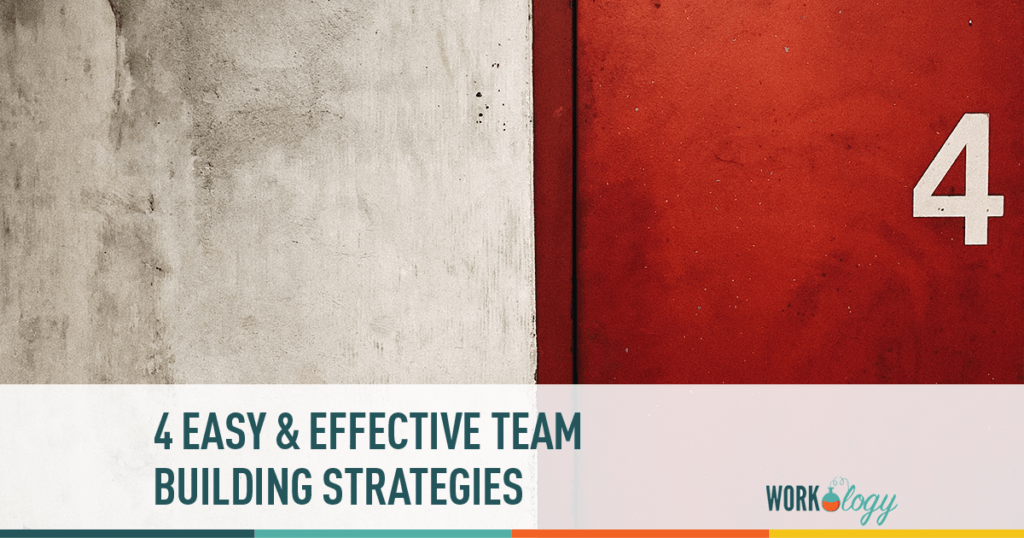For many companies, team building is the cornerstone of employee development, positive growth, and of course, a more productive workforce. When your team feels like a team they are more likely to be happy and engaged — the results of which can be seen internally through their work, and externally through favorable customer and consumer experiences.
4 Easy & Effective Team Building Strategies
While we don’t all have the time to nurture and cultivate a team into the “perfect” workforce, it doesn’t mean management should just forgo the idea all together. Here are some simple steps you can take to get your team on the right path and effective without breaking the bank or using up too many resources:
Play up strengths and desires
Team building is kind of like building a skyscraper: You have to use the best elements of each piece of framework in order to achieve the strongest building. It’s the same with your team. Understand their strengths and where they want to go — what their desires are and where their passion is — and that will lead them toward fantastic results.
Instead, figure out what the optimal skills of each team member is, whether it’s Web design, copywriting, presentations, cold calling, etc. When you play up the strengths and desires of every worker, you simultaneously give them work they are good at and work that keeps them engaged…which helps them foster the career they want.
Encourage Social Performance Management
Social performance is a different way to engage your employees and transform your company. Think of it as increased collaboration through sharing goals, recognizing achievements, and having performance conversations as results happen throughout the workday. When you encourage social performance, you encourage your team to work together in their day-to-day activities, whether those activities are explicitly linked or not. This also lets employees see the impact of their performance and the weight of their roles, and are responsible for their own performance management which may even increase employee loyalty to the organization.
Create a Culture of Feedback
What’s better, real-time feedback on every goal and objective, or a performance review given once a year? Though the former is one of those most common feedback tools, it’s not practical in our ever-changing work environments. In fact, a SHRM survey shows 45 percent of HR professionals admit performance reviews do not enhance performance. Effective performance management still remains a major workforce challenge for more than half of all HR professionals, and creating a culture of feedback can help. Employees need your assistance as the goal is being worked on, not a year later when those observations may not even be relevant anymore.
Have team members and managers give their thoughts and opinions on current goals so the employee understands what they’re doing right and what they need to improve upon in order to instill a culture where feedback is prevalent. It not only helps them to work better, but also gives them confidence and direction in their performance, now and in the future. Employee empowerment helps drive the employee culture of feedback and excellence.
Implement Virtual Strategies
Remote teams are the future and the now. This is why companies are leveraging collaboration techniques to connect this workforce.
In virtual work environments, communication may be an issue because you’re not face-to-face with a co-worker or manager. The more you collaborate with your virtual team, the better. It can certainly lead to more productive team. Think about using Skype or another chat platform to engage with your team about work matters, as well as talking about their day or what they did last weekend.
Additionally, don’t forget about other collaboration platforms such as Box and Google Docs for sharing documents and images or Basecamp and Do.com for project management, along with other project management and social performance tools.
What do you think? What are some other team building strategies?
Morgan Norman is the Co-Founder and CEO of WorkSimple, the social performance application that works the way you do — focused on Social Goals, feedback and recognition for you, your team, and company. Connect with him and WorkSimple on Facebook and @WorkSimple on Twitter.










One Comment
It alarms me when I read – Effective performance management still remains a major workforce challenge for more than half of all HR professionals. Why is it a challenge for HR pros to think of an effective solution. Love the concept of social performance. Yammer is also a great internal tool. It can inspire the daily feedback loops and goal sharing. Leaders can use Yammer to reinforce key organizational messages and goals; recognize teams and individuals; link people’s work to each other (i.e. through #tagging). It’s great at connecting globally across time zones and can reduce email spam!
Comments are closed.